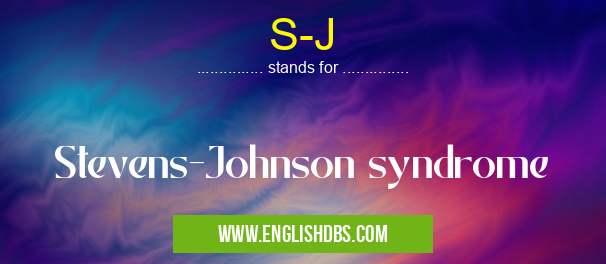What does S-J mean in MEDICAL
S-J is an abbreviation commonly used in medical settings to refer to Stevens-Johnson Syndrome (SJS). SJS is a serious rare skin disorder that often affects the eyes and mucous membranes. It can be caused by a reaction to certain medications, infections, or illnesses. Symptoms of SJS may include fever, skin lesions, blisters, red patches on the skin and mucous membranes, eye irritation, ulcers in the throat or mouth, and increased sensitivity to light. Treatment typically includes steps to address the underlying cause of SJS as well as therapies to reduce the symptoms.

S-J meaning in Medical in Medical
S-J mostly used in an acronym Medical in Category Medical that means Stevens-Johnson syndrome
Shorthand: S-J,
Full Form: Stevens-Johnson syndrome
For more information of "Stevens-Johnson syndrome", see the section below.
Overview
Stevens-Johnson Syndrome (SJS) is a rare but severe reaction of the body’s immune system. It usually occurs when someone has taken a particular medication or has been exposed to an infection or illness such as chickenpox or measles. The syndrome causes painful rashes on the face and body parts made up of swollen red spots with dark blisters that can spread to other parts of the body. Other symptoms include eye inflammation, conjunctivitis (also known as pink eye), severe itching, fever, sore throat and inflamed mucous membranes in other parts of the body such as mouth and genitals. In serious cases it can even cause blindness or death if not treated immediately.
Signs & Symptoms
The signs and symptoms associated with Stevens-Johnson Syndrome vary from person to person but may include: fever; rash; redness on both lips (this will usually start centrally); development of large blisters on face, trunk and/or extremities; severe itching; dryness in nose & mouth; eye irritation & inflammation (conjunctivitis); peeling of skin on palms & soles; sore throat; swollen lymph nodes; thickening & darkening of nails; oral ulcers or sores.
Causes
Most cases of Stevens-Johnson Syndrome are caused by medications such as antibiotics (especially sulfa drugs) anticonvulsants for epilepsy, allopurinol for gout treatment pain relievers including ibuprofen & naproxen anti-malaria medications nonsteroidal antiinflammatory drugs diuretics beta blockers & antipsychotics occasionally exposure to an infection will trigger SJS.
Treatment
Treatment for Stevens-Johnson Syndrome typically involves stopping any medicines which may have caused it initially. If this is not possible due medications necessary for other conditions then alternative treatments may be prescribed. Other treatments which could help include topical ointments containing corticosteroids or antihistamines for itch relief along with pain killers such as acetaminophen when needed. In severe cases where there is extensive damage additional treatments such as oxygen therapy IV fluids or antibiotics may be required.
Essential Questions and Answers on Stevens-Johnson syndrome in "MEDICAL»MEDICAL"
What is Stevens-Johnson syndrome?
Stevens-Johnson syndrome (SJS) is a rare but life-threatening skin disorder. SJS is an extreme form of a skin reaction called an acute allergic eruption which causes redness, blisters and sores on the skin. It can also affect other parts of the body, including the mouth, eyes, throat and lungs. Complications can be serious, even life threatening if not managed quickly.
What are the signs and symptoms of Stevens-Johnson Syndrome?
Signs and symptoms of SJS may include redness, rashes or patches on the skin; blisters on the skin or mucous membranes; flu-like symptoms; fever; chills; swollen lymph nodes; eye irritation or discharge; difficulty breathing or swallowing. In more severe cases it can lead to vision loss, shock and organ failure.
Who is at risk for developing Stevens-Johnson syndrome?
Anyone can develop SJS, however certain people have a higher risk for developing it including those who take medications such as antibiotics, anticonvulsants and sulfonamides as well as those with weakened immune systems due to illnesses such as HIV/AIDS or cancer.
How is Stevens-Johnson Syndrome diagnosed?
Diagnosis of SJS typically includes physical examination and laboratory tests that measure inflammatory markers in the blood as well as skin biopsy results which can help confirm diagnosis.
How is Stevens-Johnson Syndrome treated?
Treatments for SJS vary depending upon severity but may include discontinuing use any medicines that triggered the reaction, high dose corticosteroids intravenously to reduce inflammation who are producing mucosal erosions as well oxygen treatments to help treat respiratory complications associated with the disease.
Are there long term effects associated with Stevens-Johnson Syndrome?
Yes potential long term effects from SJS can include scarring and disfigurement of affected body parts due to damage from blistering , permanent damage to internal organs from infection , chronic fatigue , chronic pain , memory loss , dry eyes and vision disturbances.
Is there a cure for Stevens-Johnson Syndrome?
Unfortunately there is no known cure for SJS but treatment of acute issues like infections should be given immediately in order to prevent further progression and minimize long term complications.
Final Words:
Stevens-Johnson Syndrome is a rare but serious disorder that requires immediate medical attention once it has been diagnosed in order to prevent further damage or even death from occurring. While some cases will clear up quickly with proper care if left untreated it can become very dangerous especially if infectious agents are involved. By understanding what causes this condition it will help those affected receive early diagnosis and prompt treatment before any lasting effects occur.
